Table of Contents
Get started with MyPerfectResume today!
- Build a resume on any device
- Pick an ATS-friendly template
- Tailor with AI copy suggestions
Why this resume works
- Quantifies accomplishments: By optimizing machine output by 20% and reducing downtime, the applicant showcases a commitment to measurable improvements in efficiency.
- Highlights industry-specific skills: The applicant’s skills in troubleshooting and preventive maintenance highlight their suitability for roles focused on machinery efficiency and safety compliance within the manufacturing sector.
- Uses action-oriented language: Action verbs like “optimized,” “troubleshot,” and “implemented” demonstrate the applicant’s proactive approach to improving productivity.
More Machine Operator Resume Examples
Review our machine operator resume examples to see how to highlight your technical skills, hands-on experience, and safety expertise. These production resume samples provide a strong foundation for creating a resume that showcases your qualifications and positions you as a top applicant in manufacturing roles.
Entry-Level Machine Operator
Why this resume works
- Effective use of keywords: By embedding role-specific keywords like “machine operator” and “CNC skills,” the applicant optimizes their resume for applicant tracking systems (ATS).
- Shows digital literacy: The applicant showcases digital literacy through CNC machine operation, aligning with essential computer skills needed in tech-driven workplaces.
- Centers on academic background: Highlighting a bachelor’s degree in mechanical engineering in the education section shows the applicant’s strong academic foundation early in their career.
Mid-Level Machine Operator
Why this resume works
- Points to measurable outcomes: By reducing waste by 20% and improving product output by 30%, the applicant showcases a keen ability to drive measurable improvements in manufacturing environments.
- Demonstrates language abilities: Language skills in Spanish, German, and French suggests the applicant’s capability for effective cross-cultural communication, which can improve global teamwork.
- Includes a mix of soft and hard skills: Combining CNC machine operation with training new hires highlights a balance of technical expertise and interpersonal skills essential for thriving in collaborative settings.
Experienced Machine Operator
Why this resume works
- Lists relevant certifications: Listing certifications like Certified Machine Operator and Advanced Production Techniques from respected bodies shows dedication to mastering skills.
- Maximizes readability: The effective use of whitespace and clear section headings guide the reader and helps them quickly scan your resume.
- Emphasizes leadership skills: Training colleagues to boost team skill illustrates strong leadership skills, showcasing an ability to elevate group performance through mentorship.
Machine Operator Resume Template (Text Version)
Min Johnson
Buffalo, NY 14206
(555)555-5555
Min.Johnson@example.com
Professional Summary
Experienced machine operator specializing in efficiency, with a proven track record in optimizing processes, boosting productivity, and maintaining safety. Expertise in machine troubleshooting and workflow optimization.
Work History
Machine Operator
Precision Manufacturing Corp. – Buffalo, NY
April 2023 – August 2025
- Optimized machine output by 20% improving efficiency.
- Troubleshot machinery reducing downtime by 15%.
- Conducted routine maintenance ensuring safety compliance.
Assembly Technician
Global Industrial Equipment Ltd. – Hillcrest, NY
April 2020 – March 2023
- Assembled parts achieving a 95% accuracy rate.
- Reduced assembly time by 10% improving workflow.
- Implemented quality control inspections increasing output.
Production Specialist
Midwest Manufacturing Inc. – Hillcrest, NY
April 2019 – March 2020
- Operated production line equipment with high precision.
- Managed inventory reducing waste by 8%.
- Collaborated on projects increasing team productivity.
Skills
- Machine Operation
- Preventive Maintenance
- Troubleshooting
- Quality Assurance
- Technical Documentation
- Inventory Management
- Safety Compliance
- Workflow Optimization
Education
Master’s Mechanical Engineering
Westfield University Champaign, Illinois
May 2019
Bachelor’s Industrial Technology
Lincoln Technical Institute Normal, Illinois
May 2017
Certifications
- Certified Machine Operator – National Institute for Metalworking Skills
- Lean Manufacturing Certification – Manufacturing Skills Standards Council
Languages
- Spanish – Beginner (A1)
- German – Intermediate (B1)
- French – Beginner (A1)
Related Resume Guides
Advice for Writing Your Machine Operator Resume
Check out our guide on how to write a resume and learn how to effectively showcase what makes you the ideal applicant for the role.
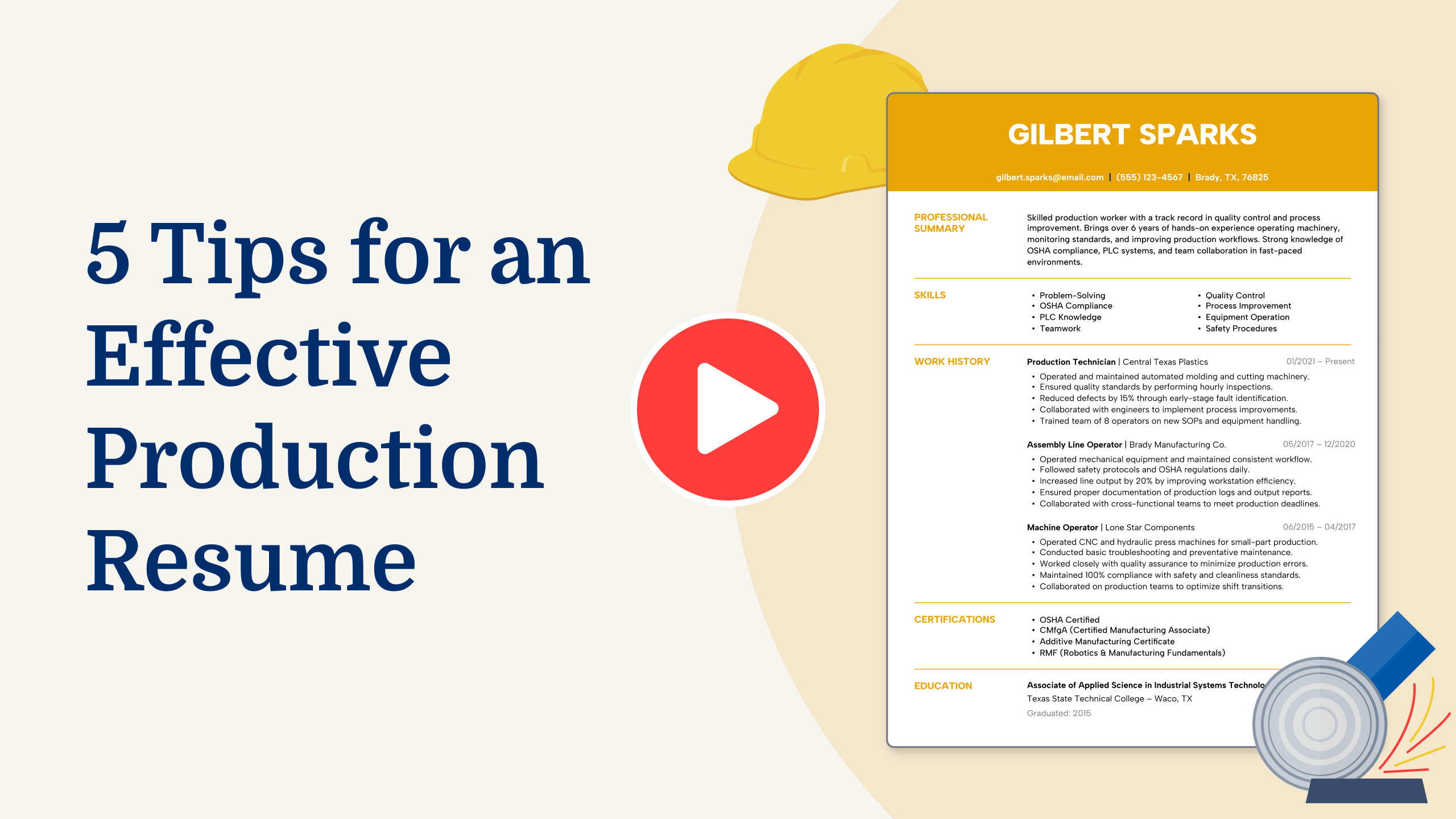
Highlight relevant technical skills
For a machine operator role, technical skills are essential to performing tasks efficiently and maintaining workplace safety. Create a technical skills section or weave these abilities into your work experience to show their direct relevance to previous roles. Focus on practical abilities that showcase your expertise in operating, maintaining, and troubleshooting machinery.
Key technical skills for machine operators include skill with various types of industrial equipment, the ability to read blueprints or schematics, and experience using measurement tools like calipers and micrometers.
Highlight any work involving production machines such as lathes, CNC equipment, or conveyor systems. Additionally, emphasize your understanding of basic mechanical repairs and processes like machine setup while demonstrating commitment to safety protocols.
To further differentiate yourself, mention familiarity with manufacturing software such as programmable logic controllers (PLCs) or inventory management systems. Incorporate examples of working with quality control tools or techniques that ensure products meet specifications.
Tailor the discussion of these skills based on the job description to align them specifically with the equipment or tools referenced by the employer.
Example of a technical skills section
- CNC machine operation
- Preventive maintenance
- Quality control inspection
- Blueprint reading
- G-code programming
- Machinery setup and calibration
- Industrial safety protocols
- Troubleshooting mechanical issues
- Operating hydraulic and pneumatic systems
- Production scheduling
Don’t forget about soft skills! Teamwork, communication, and adaptability can be just as important as technical skills in many jobs. Use our Resume Builder to ensure your resume shows a balanced skill set.
Quantify your accomplishments
Quantifying accomplishments on a resume can make it stand out by showing real results instead of just listing what you did. When adding entries to the work experience section, it’s important to include your job title, the employer’s name, location, and employment dates.
For a machine operator, turning duties into achievements could mean highlighting specific improvements you made. For example, rather than saying you operated machinery, state how you increased production speed by 20% or reduced downtime by scheduling regular maintenance.
Using action verbs and numbers in the work experience section helps create a resume that is focused on results. Instead of saying “responsible for operating machines,” say “improved machine efficiency by implementing new procedures.” This way, hiring managers can quickly see your impact and skills.
Quantified accomplishments help them understand what you’ve done before and what you might bring to their company. By clearly showing your achievements with numbers and details, your resume becomes more compelling and gives employers a clear picture of your capabilities as a machine operator.
5 machine operator work history bullet points
- Operated CNC machines to produce precision parts, achieving a 98% accuracy rate and reducing scrap by 10%.
- Conducted routine maintenance on industrial machinery, decreasing equipment downtime by 25% over the year.
- Collaborated with quality control team to improve product standards, resulting in a 15% increase in customer satisfaction.
- Trained new machine operators, improving team productivity by 20% through skill development and mentorship.
- Implemented safety protocols that reduced workplace accidents by 30%, fostering a safer work environment.
Stuck on what to write in your resume? Check out these professional resume examples for ideas on how to make your skills and experience stand out.
Write a powerful professional summary
A professional summary is a snapshot of your career that grabs attention right away, much like the opening scene in a movie setting the tone for what’s to come.
The professional summary highlights your experience, skills, and achievements in just a few sentences. It’s suitable for those who have been in their field for a while and shows off your professional identity, allowing hiring managers to see the value you bring to the table.
In contrast, resume objectives focus on what you want to achieve in your career and are great for people new to the workforce or switching careers. While summaries say “here’s what I’ve done,” objectives express “here’s what I aim to contribute.”
Now that we’ve covered what summaries and objectives do, let’s dive into examples tailored to various industries and experience levels.
Machine operator resume summary examples
Entry-level
Recent graduate with a certificate in machine tool technology and hands-on training in operating CNC machines, troubleshooting equipment, and reading blueprints. OSHA-certified and familiar with safety guidelines for industrial environments. Eager to contribute foundational skills to support production efficiency and quality control.
Mid-career
Experienced machine operator with over seven years in manufacturing environments, specializing in CNC machining, assembly line operations, and equipment maintenance. Skilled in optimizing production workflows, minimizing downtime, and adhering to strict quality standards. Known for strong teamwork and the ability to adapt to fast-paced settings while consistently meeting deadlines.
Experienced
Seasoned machine operator with over 15 years of expertise in advanced manufacturing processes, including precision machining, automation systems, and lean production methods. Proven track record of reducing production costs through process improvements while maintaining high product quality standards. Adept at mentoring junior operators and collaborating with cross-functional teams to achieve operational excellence.
Machine operator resume objective examples
Entry-level
Detail-oriented individual with a strong interest in manufacturing processes seeking an entry-level machine operator position. Eager to apply technical training and hands-on skills gained through vocational courses to contribute to efficient production and learn new techniques within a dynamic team.
Career changer
Dedicated professional transitioning from retail management into the manufacturing sector, eager to bring strong organizational and problem-solving skills to a machine operator role. Committed to learning machinery operation and contributing to production goals while ensuring safety and quality standards are met.
Recent graduate
Recent technical school graduate with coursework in mechanical systems looking for a machine operator position. Excited to leverage classroom knowledge and practical skills in CNC operations and maintenance, aiming to support innovative manufacturing practices and continuous improvement initiatives.
Choose a simple resume template that is neat and easy to read. Opt for clear headings and basic fonts, avoiding excessive design elements to highlight your job skills effectively.
Showcase your credentials
For a machine operator, listing certifications and specialized training is important because it shows you have the needed skills and knowledge. In technical fields, employers often look for proof that you can handle complex tasks safely and effectively.
A dedicated certifications section on your resume helps highlight this expertise clearly. It can be a great addition to your education section, showing that you continue to learn and grow in your field.
- Certified Production Technician
- Forklift Operator Certification
- OSHA Safety Certificate
- Six Sigma Yellow Belt
- Lean Manufacturing Certification
Having these certifications on your resume shows that you’re ready to meet the demands of being a machine operator. They help set you apart from others by proving you have the training needed to succeed. Employers will see you’re committed to doing things right and keeping everyone safe.
Example of a certifications section
Forklift Operator Certification
Issued by: Occupational Safety and Health Administration (OSHA)
Expires 2025
Certified Machine Tool Operator (CMTO)
Issued by: National Institute for Metalworking Skills (NIMS)
Issued 2023
CNC Machining Certification
Issued by: Society of Manufacturing Engineers (SME)
Issued 2022
Hazardous Materials Handling Certification
Issued by: Environmental Protection Agency (EPA)
Expires 2027
Basic Life Support (BLS) Certification
Issued by: American Heart Association
Expires 2026
Use our ATS Resume Checker to spot common formatting and content errors and optimize your resume to pass ATS.
Salary Insights for Machine Operators
Thinking about your future job? The U.S. Bureau of Labor Statistics shares pay information to help you see what you could earn and the trends in the job market. More details are provided below.
Top 10 highest-paying states for machine operators
Machine Operators earn varying salaries across the United States, with a national average of $45,651. The table below highlights the states where machine operators command the highest compensation.
Our salary information comes from the U.S. Bureau of Labor Statistics’ Occupational Employment and Wage Statistics survey. This official government data provides the most comprehensive and reliable salary information for machine operators across all 50 states and the District of Columbia. The figures presented here reflect the May 2025 dataset, which is the most recent available as of this publication.
| State | Average Salary |
|---|---|
| Washington | $63,530 |
| Guam | $59,180 |
| Rhode Island | $56,230 |
| Utah | $55,030 |
| Texas | $54,260 |
| Minnesota | $53,630 |
| Kentucky | $53,320 |
| Oklahoma | $52,200 |
| Iowa | $52,270 |
| Wyoming | $51,870 |
FAQ
Do I need to include a cover letter with my machine operator resume?
Yes, including a cover letter with your machine operator resume can give you an edge in the hiring process.
A cover letter lets you explain why you’re interested in the role and highlight specific skills, like operating specialized machinery or maintaining safety standards, that align with the job requirements.
If the company prioritizes efficiency or has unique equipment, you can use this opportunity to showcase relevant experience or certifications that set you apart.
To make things easier, try using a Cover Letter Generator to quickly create a professional and personalized cover letter tailored to your application.
You can also explore cover letter examples designed for similar positions to ensure yours effectively communicates your qualifications and enthusiasm for the role.
How long should a machine operator’s resume be?
For a machine operator, a one-page resume is often sufficient to highlight your skills and experience effectively. Focus on detailing your skill with various machinery, safety protocols, and any specialized training or certifications you have.
However, if you’ve worked in multiple roles or have extensive experience, a two-page resume can be acceptable. Include detailed examples of your work history, specific machines you’ve operated, and any achievements in efficiency or safety improvements.
Explore our guide on how long a resume should be for more tips on determining the ideal length based on your career stage.
How do you write a machine operator resume with no experience?
Writing a resume with no experience as a machine operator can seem daunting. However, if you focus on the right elements, you will stand out. Here are some tips to craft an effective entry-level resume:
- Emphasize relevant skills: Highlight technical skills that are transferable to machine operation, such as mechanical aptitude or familiarity with tools and machinery from hobbies or coursework.
- Focus on education and training: List any courses or certifications related to manufacturing, engineering, or safety protocols. If you’ve completed workshops or online courses in machinery operation, include those too.
- Showcase volunteer work or internships: If you’ve volunteered in environments like workshops or industrial settings where you handled equipment under supervision, detail those experiences.
- Highlight soft skills: Employers value skills like attention to detail, problem-solving abilities, and reliability. Make sure these qualities are evident in your descriptions of past roles or projects.
Rate this article
Machine Operator
Share this page
Additional Resources
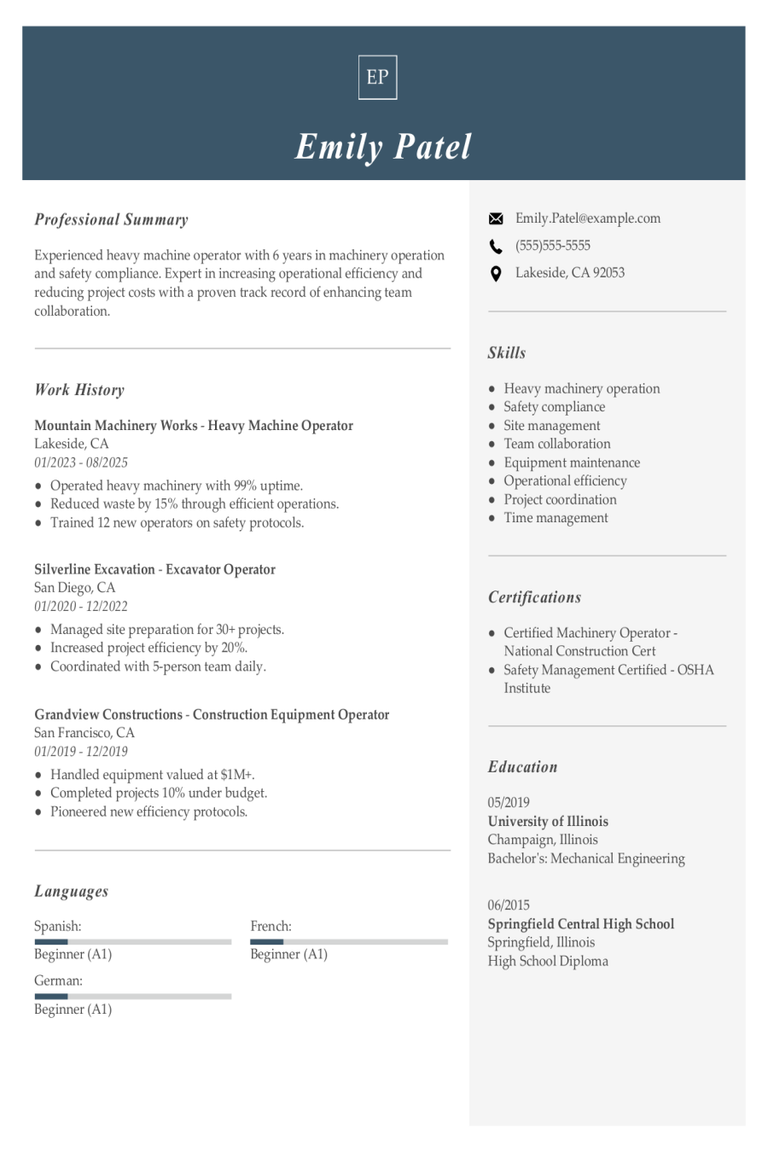
Heavy Machine Operator Resume Examples & Templates
Learn how heavy machine operators showcase their skills in safety and equipment handling. These resume examples and tips will help you highlight your experience with machinery and job site efficiency
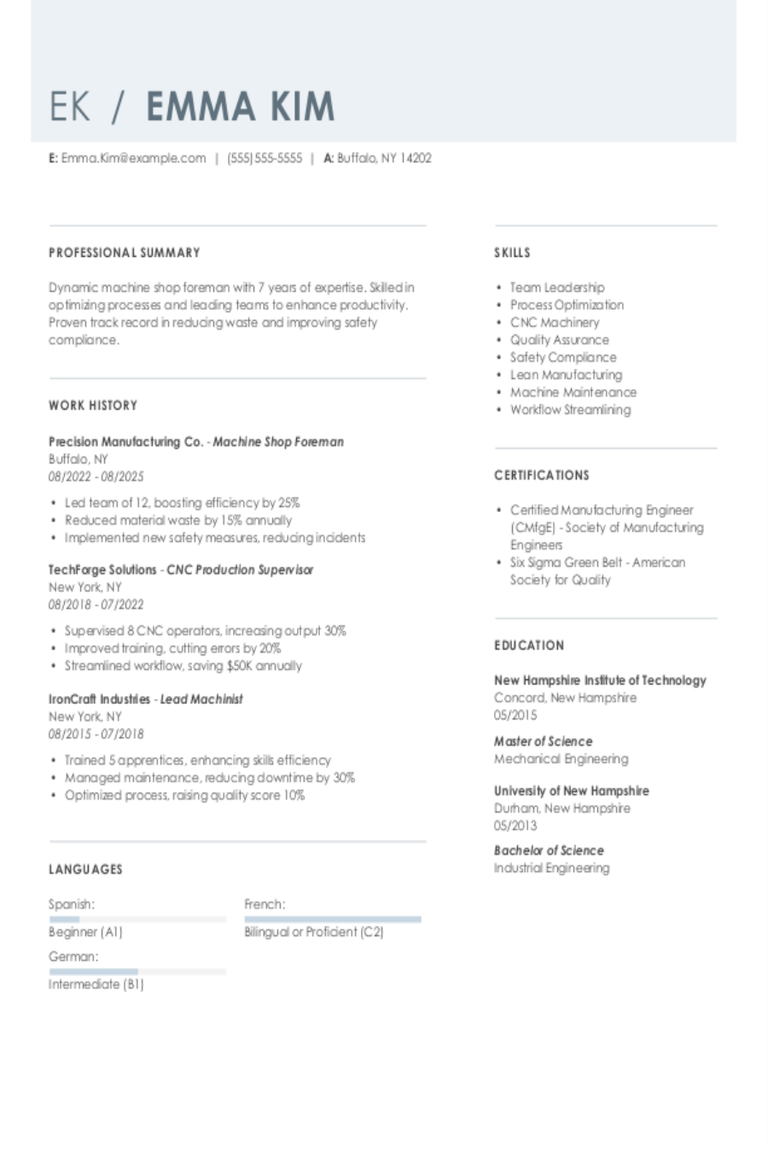
Machine Shop Foreman Resume Examples & Templates
Discover machine shop foreman resume examples that highlight key skills in supervising and managing shop operations. Learn how to effectively showcase your experience with machinery and team leadership to catch
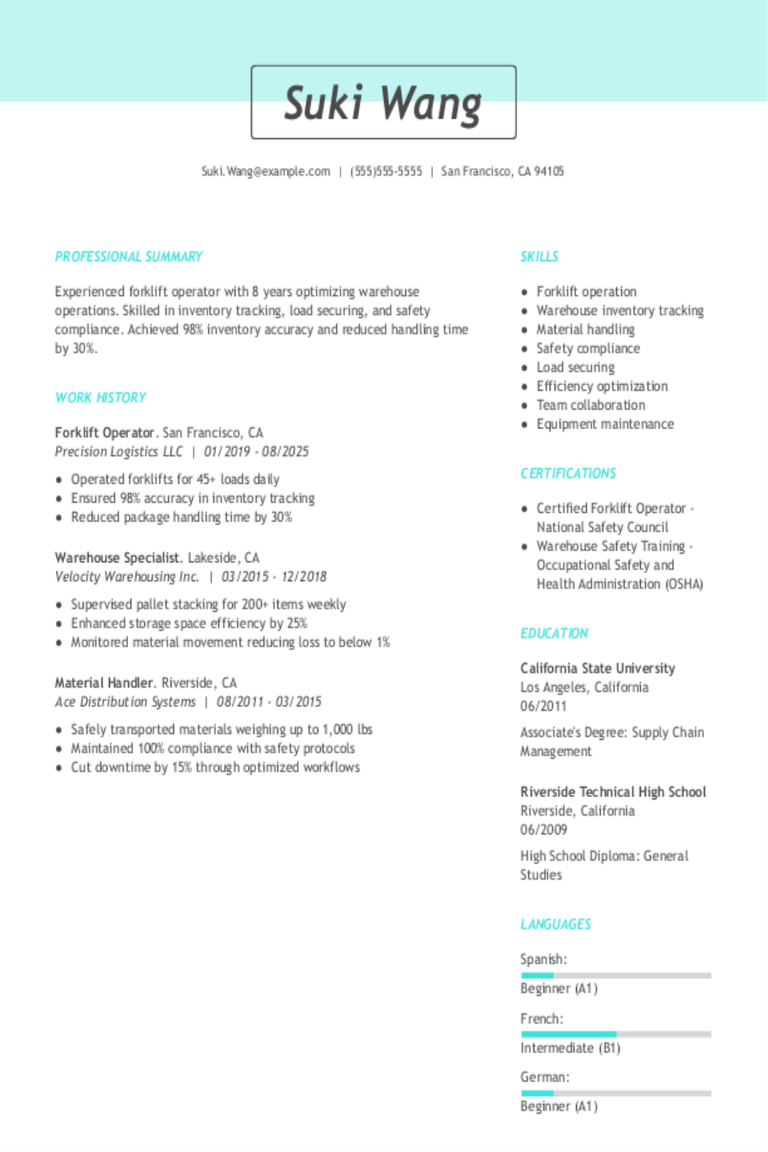
Forklift Operator Resume Examples & Templates
Discover forklift operator resume examples and learn how to write about safety, teamwork, and handling heavy loads while keeping everything organized.Build my resumeImport existing resumeCustomize this templateWhy this resume worksQuantifies
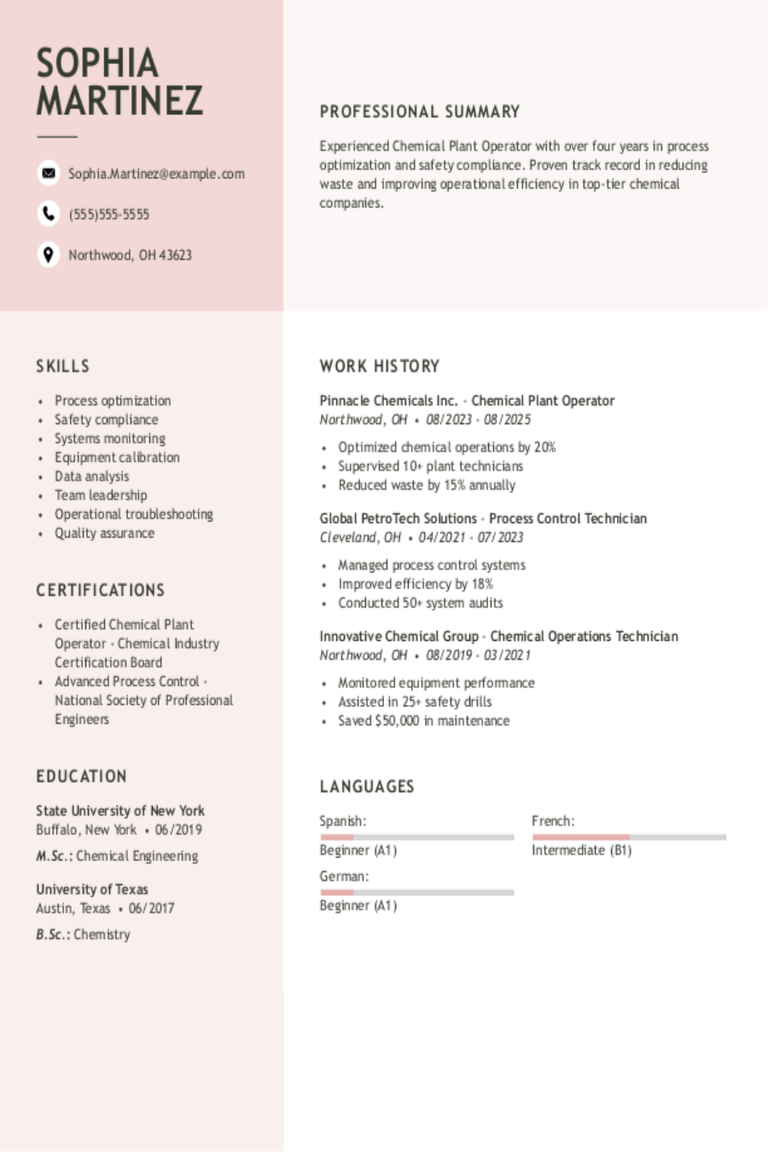
Chemical Plant Operator Resume Examples & Templates
Explore chemical plant operator resume examples and learn tips to highlight your skills and experience in operating machinery and ensuring a safe work environment.Build my resumeImport existing resumeCustomize this templateWhy
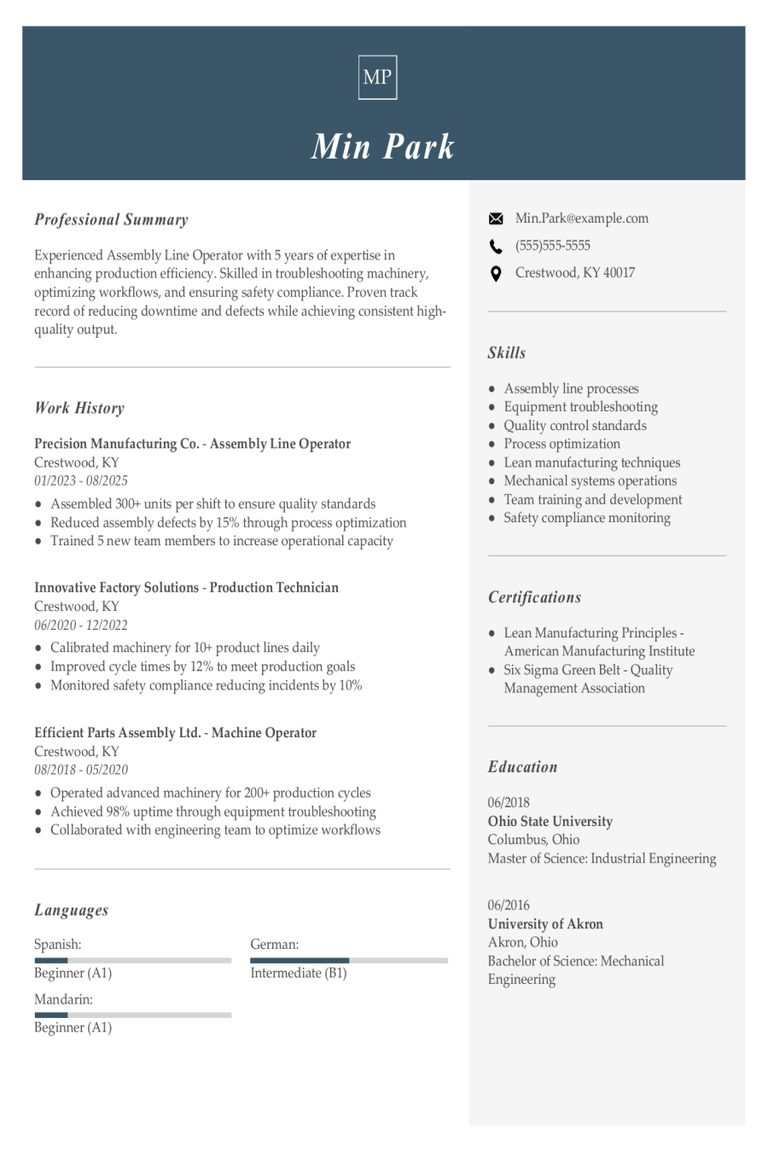
Assembly Line Operator Resume Examples & Templates
Browse assembly line operator resume examples and learn how to showcase you work with machinery, follow instructions, and ensure product quality.Build my resumeImport existing resumeCustomize this templateWhy this resume
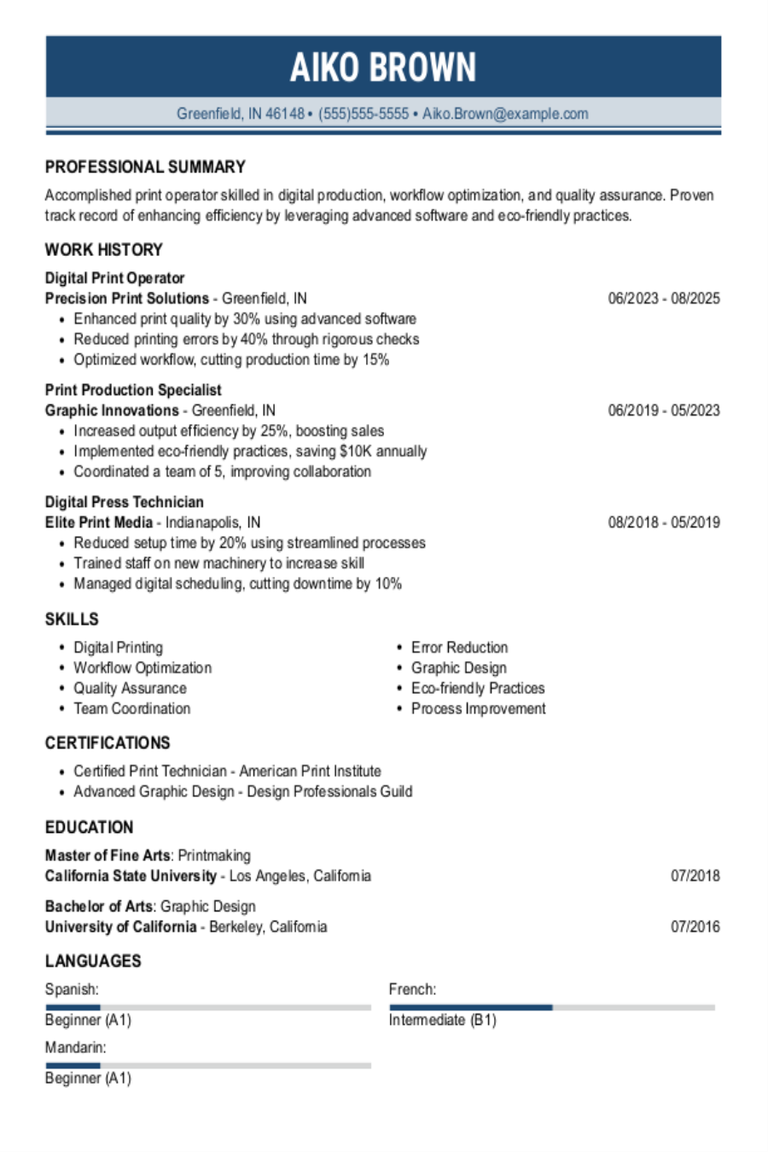
Digital Print Operator Resume Examples & Templates
Explore digital print operator resume examples to see how to showcase your ability to run printing machines, maintain quality standards, and troubleshoot issues. These examples and tips make it easy
